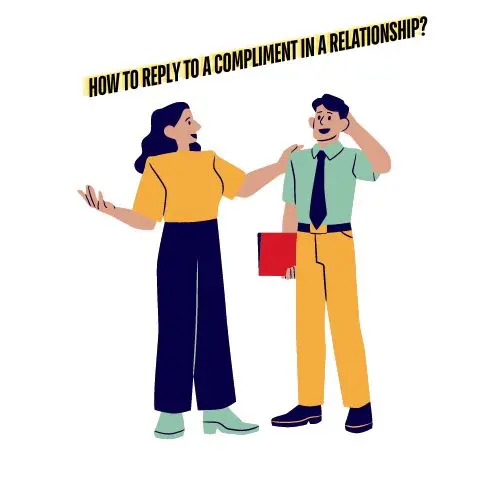Introduction
Getting compliments is a little creepy in a relationship — if you’ve never been one to get them. However, the nice feelings associated with now receiving them gracelessly versus dismissively form an attachment within the scope of romance, in general this is pretty good social etiquette to over apply in any interaction not specifically within the context of flirting. Next comes the following guide, which shows how to respond to compliments from your partner.
Compliment Response Statistics
| Response Type | Resulting Impact on Relationship |
| Deflecting or denying the compliment | Can make your partner feel unappreciated or discourage future compliments |
| Overly enthusiastic or exaggerated response | It may come across as disingenuous or fishing for more compliments |
| Giving a compliment in return | Shows appreciation and fosters reciprocity in the relationship |
| Saying “Thank you” sincerely | Simple yet powerful acknowledgment of your partner’s sentiment |
Why Proper Compliment Response Matters

Receiving compliments may feel embarrassing, but responding to them respectfully is important for building intimacy and trust in a romantic relationship. Some key reasons why learning how to reply to compliments matters include properly:
- It promotes more compliments. Further encouragement for a person to continue complimenting you in the future is the feeling that your partner appreciates your response. There are positive feelings on both parties or rather positive sentiments.
- It strengthens emotional connection: By responding to compliments and reproaching, it is possible to show affection and admiration for each other between the two partners.
- Apparently, it is a relational skill. It is for the same reason that accepting compliments gracefully adds to other social skills concerning the approach to the other half and contributes to maintaining intimacy.
- It boosts your partner’s self-esteem: Real and true responses will let the compliment giver know you appreciate their positive view of you. It also has a positive effect on them.
With practice, you’ll learn to respond naturally in a way that expresses gratitude and keeps the compliment conversation flowing positively between you.
Common Compliment Response Mistakes

Before looking at better response options, it’s helpful to identify some typical mistakes or ineffective responses people often give:
- Discounting or dismissing the compliment: Words like, “No, I’m not,” or “Okay, you’re only overdoing it” cancel out those positive words.
- Deflection: There is going to the next topic as well, without having time to comprehend the information given.
- Self-insulting jokes: Of course, making fun is one thing; however, in response to an actual compliment, it just loses its point and suffocates the complimentary sentiment.
- Rhapsodizing: Saying, “Oh, the necklace you gave me is lovely. Imagining a two-year-old uttering statements such as, “Oh, I can now go to heaven,” may not be the message you will want the child to have walking out of the store.
- Focused only on physical appearance: If your friend says you are smart or well-behaved enough, don’t take it as a cue to only worry about your looks.
- Demanding more compliments: Returning a reaction in a manner that depicts you are starved for compliments is quite an off-put.
Avoiding these pitfall responses and learning more affirmative techniques helps your partner feel appreciated for their thoughtfulness.
Effective Compliment Response Strategies

Here are some recommended strategies for responding well when your partner pays you a compliment in the relationship:
- Say Thank You
A polite nod with words like “Thank you” forms probably the weakest feedback and cannot be criticized simultaneously. It cuts across their kind words by squarely addressing them with much appreciation. It’s also okay to smile while saying thank you, so you can also be warm with your words.
- Provide a Brief Explanation
If you ever get caught off guard with a compliment, you can justify your reaction for a couple of words before you say thank you. For example, “Oh, shucks, are you really? It is really nice of you to say that. I have never been given that compliment, so thank you very much! It will help you keep all your opinions succinct and prevent the comments from devolving into discussions of their benignness or not.
- Compliment Them Back
Following a compliment with a compliment offered to the partner is a life-nurturing way of extending the compliment line. It is crucial to reciprocity; add something you appreciate after the positive endorsement for him to say, for instance, “Thank you, you also look handsome today.”
- Ask for Clarification
You can ask them to expand if you are unsure how to reply. “That’s very kind of you; how did you come to that?” To respond politely is to pay attention, while blunt rejection dismisses the compliment outright.
- Reference a Specific Trait
If the compliment touches on one of your skills or talents, accept that skill before responding; thank you. For example, “Awww, thanks for finally acknowledging I am hardworking.” I just wanted to say ‘‘I really appreciate you saying that.’’
- Show Modest Appreciation
Dutiful self-acknowledgments with a bow of the head and zero attempts of understatement but also no proud gestures seem more desirable than those rude and unnecessary deflections. As such, engage him/her in a conversation by saying something like “You are always so caring, you always know how to make me feel special.” I’m flattered, thank you.”
- Smile or Make Eye Contact
Apart from that he or she should shake their hand warmly, look into their eyes briefly or just a brief hug or perhaps a kiss is another way of showing that you really mean the compliment in good faith.
Maintaining the Compliment Conversation

Once you’ve thanked your partner for their kind words, consider ways to keep the compliment dialogue going in a natural, positive manner:
- Tell them that and ask them why they said that, to know the full story.
- Take the time, in turn, to mention something you know you really like about them.
- When someone compliments you, the first thing to do is think of a memory to associate with that compliment, and fear not; the feeling is happy.
- How do you go from one topic to another or show that you are involved and care about their day or interests?
- Kiss or hug when you are arguing or when the conversation is a little more intense
You will soon be at ease with the cast of receiving compliments without much of a hustle as nourishing a positive interaction between you and your loved one with much practice. The essence of this is to respond assertively without aggression.
Dealing with Unexpected Compliments
At times, your partner may compliment you out of the blue for something you weren’t prepared for. In such scenarios:
- First of all, make your surprise short but be sure to say thank you
- If the candidate is very much taken by surprise, ask for time for the information to sink in.
- Make sure you will have favorable thoughts about it rather than getting into the realm of no way/thoughts that cannot be trusted.
- As much as you can, don’t read too much into their intention when they were sending the message.
- Replied with something to a level of being thankful for such consideration more than anything else
As one learns to respond graciously, it becomes easy to acknowledge compliments, whether unexpected or otherwise. Your partner would like to show some love towards you.
Frequently Asked Questions
Q. What if I don’t feel I deserve the compliment?
A. It is also important not to counter-argue or dismiss the comment. It is possible to sit down with your spouse, listen to their point, and say thank you for that while you are deep inside, knowing what you will do. A compliment is a grace; graciously accept it.
Q. What if I think my partner is buttering me up?
A. To take compliments with the understanding that they have kind intentions unless you have cause not to believe in their intentions. The potential of challenging assumptions concerns credibility at the cost of the relationship.
Q. Is ok to disagree with a compliment genuinely?
A. You may discord politely by thanking them for their view and then mention that your self-assessment differs without putting yourself down. Focus on appreciation of good intentions on their part.
Q. Do I always have to compliment back right away?
A. No, though, return in kind after some time so that they know their efforts were recognized and appreciated. You don’t need to do that right then, but returning a favor leads to closer relationships all around.
Q. How do I respond if someone gives me an inappropriate compliment?
A. Be polite but uncomfortable, indicating that inappropriate comments will not be tolerated or invited. If necessary, draw boundaries clearly but respectfully to draw a line on what may be acceptable.
Conclusion
It helps to master how to accept compliments and respond politely to the people in the relationships. As you extend the application of courtesy to compliments and learn to thank and even reciprocate affection, engage more of your mind to the qualification of words as being positive or negative, and acknowledge the good intention of your partner, you learn to grow close to your partner in the little details. Compliments are chances to both give and receive love. When you respond appropriately, there is a connection, and your loved one will feel valued for lifting your morale with kind words.

